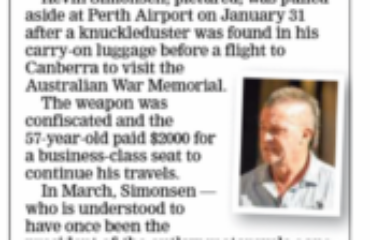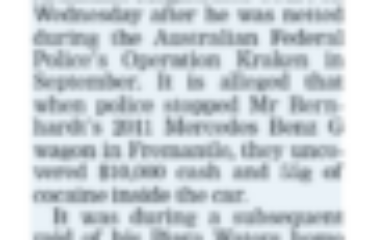A warrant has been issued for the arrest of the eminent historian and art critic Robert Hughes, who failed to appear in an Australian court to answer dangerous driving charges.
Mr Hughes’ lawyer said that the Australian-born critic, who still suffers injuries from the crash, was advised by an orthopaedic surgeon that he was not well enough to travel from his home in New York to Perth, where he was due to present himself before magistrates.
Mr Hughes, 64, has long been derided by scornful Australians as “the fatal bore”, after his most famous work, The Fatal Shore. But his transformation into one of Western Australia’s most wanted men is the latest twist in an extraordinary saga which began when he almost died in the car crash on a west-coast fishing trip three years ago.
The prosecution argues that Mr Hughes, who was also filming the BBC documentary Beyond the Fatal Shore at the time, was speeding and driving on the wrong side of the outback road when he collided with another vehicle.
The charges of dangerous driving and causing grievous bodily harm were dropped when two witnesses were charged with conspiracy to pervert the course of justice.
The witnesses, one the driver of the second car, had tried to extort £10,000 from Mr Hughes in exchange for false testimony. “It’s amazing what sort of low-life you can run into on the road,” Mr Hughes said when the case was dropped in May 2000.
Six months later the Australian supreme court ruled that the trial should be reopened.
Mr Hughes’ lawyer, Mark Andrews, said he was mystified by the prosecution’s pursuit of his client, who is internationally respected but in Australia shares the scorn many reserve for high-profile expatriates who criticise the country they have left.
“He’s no Christopher Skase,” Mr Andrews said, referring to the fugitive Australian businessman who evaded arrest for years in exile in Spain.
In a statement from New York, Mr Hughes said: “Let me make this quite clear: nobody has a greater desire to dispose of this matter than I. When I last appeared, voluntarily and without any compulsion, I was acquitted.”
Mr Hughes travelled to Australia last year for the funeral of his son, who committed suicide in the Blue Mountains.
The court has set another hearing date for July 4 to give Mr Hughes time to recover.
Since you’re here…
… we have a small favour to ask. More people are reading and supporting our independent, investigative reporting than ever before. And unlike many news organisations, we have chosen an approach that allows us to keep our journalism accessible to all, regardless of where they live or what they can afford.
The Guardian is editorially independent, meaning we set our own agenda. Our journalism is free from commercial bias and not influenced by billionaire owners, politicians or shareholders. No one edits our editor. No one steers our opinion. This is important as it enables us to give a voice to those less heard, challenge the powerful and hold them to account. It’s what makes us different to so many others in the media, at a time when factual, honest reporting is critical.
Every contribution we receive from readers like you, big or small, goes directly into funding our journalism. This support enables us to keep working as we do – but we must maintain and build on it for every year to come. Support The Guardian from as little as $1 – and it only takes a minute. Thank you.



